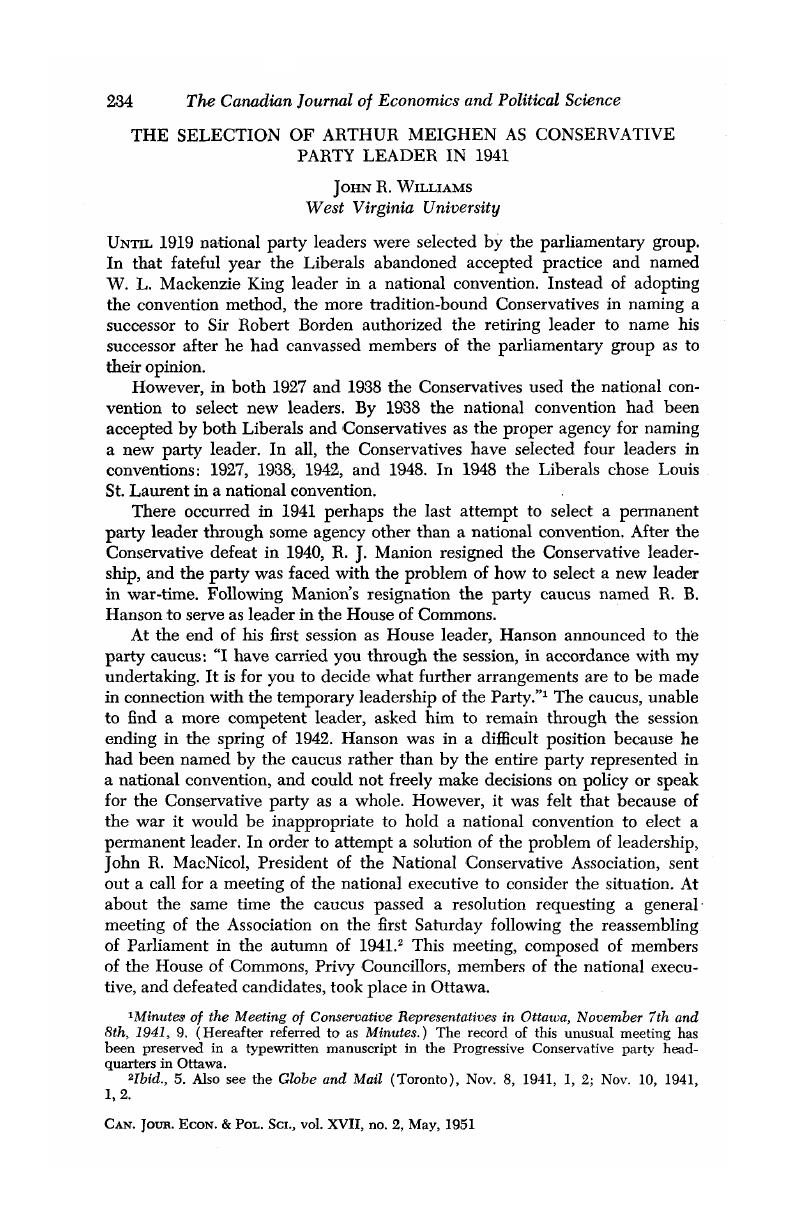Article contents
The Selection of Arthur Meighen as Conservative Party Leader in 1941
Published online by Cambridge University Press: 07 November 2014
Abstract

- Type
- Notes and Memoranda
- Information
- Canadian Journal of Economics and Political Science/Revue canadienne de economiques et science politique , Volume 17 , Issue 2 , May 1951 , pp. 234 - 237
- Copyright
- Copyright © Canadian Political Science Association 1951
References
1 Minutes of the Meeting of Conservative Representatives in Ottawa, November 7th and 8th, 1941, 9. (Hereafter referred to as Minutes.) The record of this unusual meeting has been preserved in a typewritten manuscript in the Progressive Conservative party headquarters in Ottawa.
2 Ibid., 5. Also see the Globe and Mail (Toronto), 11 8, 1941, 1, 2 Google Scholar; Nov. 10, 1941, 1, 2.
3 Cahan argued that in time of war the Opposition should be led by a permanent leader of experience who could make final decisions on policy, and that it was unfair to burden Hanson with the responsibility for making such decisions any longer than was absolutely necessary. His argument was based on the assumption that there was available to the Conservatives for leadership one man more experienced and more skilled in debate than any other: Arthur Meighen. Lawson argued: “… surely we realize that the only way to save democracy is to forget a lot about democratic procedure during war so long as you maintain the strings and rights when the war is over to get right back to democracy. And the proposal at this time to call a great Convention immediately after the war maintains that string and that control which immediately brings us back to democracy.” Minutes, 78.
Also see series of articles in the Globe and Mail, 11 3, 1941, 6 Google Scholar; Nov. 4, 1941, 6; Nov. 5, 1941, 6; and Nov. 6, 1941, 6. In these articles it was argued that there was need for a capable leader in the House, but that a convention was undesirable in war-time, and, in addition, it was unnecessary since it was obvious that Meighen was the best man available.
4 Macdonnell's argument, supported by several delegates from the West, illustrates the change which had taken place since 1920, when there was no challenge to the authority of the parliamentary group to select a new leader. Macdonnell emphasized the right of the extra-parliamentary group to participate in the selection of a new leader: “I think there is a danger lest people have their minds too much concentrated on the House of Commons Chamber in this building. I don't underestimate the importance of what goes on there, but we must also keep in mind the importance of what goes on up and down the country.” Furthermore, he said that many members of the executive entitled to attend this meeting had not come to Ottawa from the more remote sections of Canada because they did not realize the meeting would select a new leader. Minutes, 86.
5 See Minutes, 53, for text of these resolutions and votes of the committee.
6 Ibid.
7 Ibid., 57.
8 Ibid.
9 In part she said: “The difference between this Executive Committee meeting and a Convention is that a good many people are not here who would otherwise have attended this conference. Do you suppose for a minute that the delegates from Calgary who were eligible to attend this meeting would not have been here had they known that an important matter such as this was to be voted on? I would like to move that the report of this Committee be thrown out as a whole and that we proceed from scratch to do what we were called here to do—to choose the time and place for a Convention.” Ibid.
10 Clifford Sifton to J. W. Dafoe, Nov. 26, 1941. Dafoe Papers.
11 Minutes, 64.
12 Ibid., 68.
13 Ibid.
14 Ibid., 73. In explaining his position Hackett, admitting that he had voted against the resolution to ask Meighen to accept the leadership, said: “My admiration for Mr. Meighen is just as great as that of any man here. It pained me to vote that way but I felt that it was the only logical thing that I could do and I wanted to be in a position to state before this body that having taken my position there and finding myself in a totally new position—yesterday morning I was here to determine whether or not we were to have a Convention. Today I find myself in a Convention.” Ibid., 72-3.
15 Ibid., 134.
16 Ibid., 135. The vote was not recorded.
17 Ibid., 136.
18 Ibid.
19 Ibid., 144.
20 Smith, F. D. L., “Arthur Meighen and the Party Leadership,” Saturday Night, LVII, no. 11, 11 22, 1941, 14.Google Scholar Also, see Meighen's, statement on acceptance of leadership in the Globe and Mail, 11 13, 1941, 1,2.Google Scholar Editorially the Conservative Globe and Mail hailed Meighen's election as an invitation for him to use his talents again in the building of a greater Canada. Ibid., Nov. 14, 1941, 6.
- 1
- Cited by




